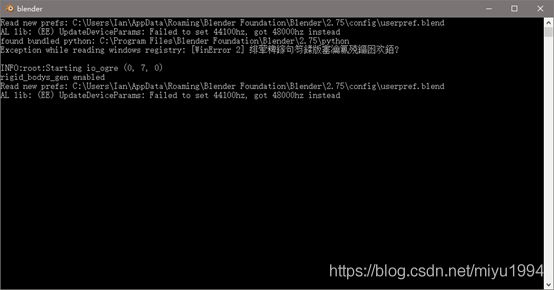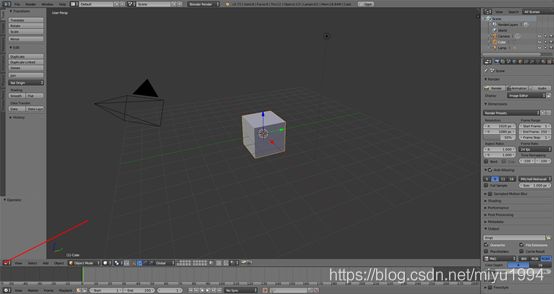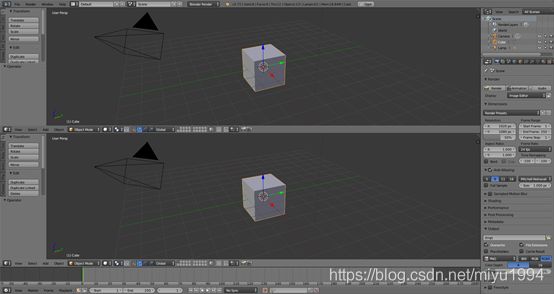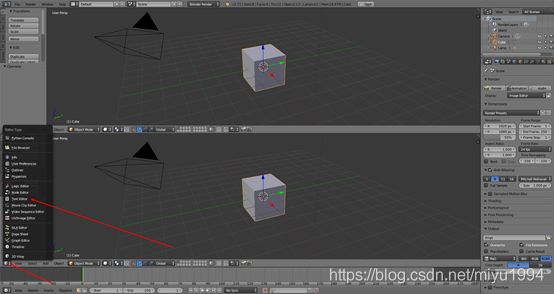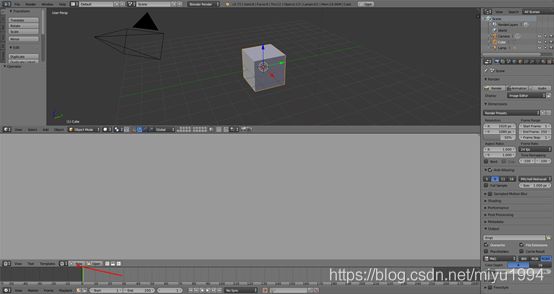- 在Mac M1/M2芯片上完美安装DeepCTR库:避坑指南与实战验证
ku_code_ku
机器学习macos推荐算法推荐系统
让推荐算法在AppleSilicon上全速运行概述作为推荐系统领域的最经常用的明星库,DeepCTR集成了CTR预估、多任务学习等前沿模型实现。但在AppleSilicon架构的Mac设备上,安装过程常因ARM架构适配、依赖库版本冲突等问题受阻。本文通过20+次环境搭建实测,总结出最稳定的安装方案。关键版本说明(2024年验证)组件推荐版本注意事项Python3.10.x向下兼容至3.7,但3.1
- 数据库数值函数详解
web安全工具库
数据库oraclejvm
各类资料学习下载合集https://pan.quark.cn/s/8c91ccb5a474数值函数是数据库中用于处理数值数据的函数,可以用于执行各种数学运算、统计计算等。数值函数在数据分析及处理时非常重要,能够帮助我们进行数据的聚合、计算和转换。在本篇博客中,我们将详细介绍常用的数据库数值函数,并通过Python和SQLite进行示例,帮助您理解和应用这些函数。1.数值函数的基本概念数值函数是用于
- Python中Requests的Cookies的简单使用
北条苒茗殇
python开发语言Requests
概述Python的Requests库中有一个cookies,是用于管理HTTPCookie的工具,可以像字典一样操作Cookie,支持自动处理作用域(域名、路径)和持久化,cookies是一个RequestsCookieJar的类型。一、概念1.作用自动存储服务器返回的Cookie根据请求域名和路径进行自动发送匹配的Cookie支持手动添加、修改、删除Cookie2.RequestsCookieJ
- Pytest基础使用
北条苒茗殇
pytest
概述Pytest是Python里的一个强大的测试框架,灵活易用,可以进行功能,自动化测试使用,可以与Requests,Selenium等进行结合使用,同时可以生成Html的报告。一、Pytest的基本使用在未指定Pytest的配置文件时,会对以下文件进行执行:test_*.py,如:test_1.py*_test.py,如:1_test.py会对以下的类和函数进行执行:类:以Test_开头的类,如
- Visual Studio Code官网下载地址及使用技巧(含常用的拓展插件推荐)
ITCTCSDN
vscodeide编辑器
VisualStudioCode(简称“VSCode”)是Microsoft于2015年4月发布的可运行于MacOS、Windows和Linux之上的跨平台源代码编辑器,它具有对JavaScript,TypeScript和Node.js的内置支持,并具有丰富的其他语言(例如C++,C#,Java,Python,PHP,Go)和运行时(例如.NET和Unity)扩展的生态系统。VisualStudi
- python中rmdir和rmtree的用法
Gin387
python
shutil.rmtree()是Python中shutil模块提供的一个函数,用于递归删除整个目录树(包括子目录和所有文件)。os.rmdir()(只能删除空目录)不同,shutil.rmtree()可以强制删除非空目录importshutil#删除指定目录及其所有内容shutil.rmtree('path/to/directory')
- 构建 Python 插件架构:打造灵活可扩展的模块化应用
全栈探索者chen
pythonpython架构开发语言学习机器学习程序人生插件
构建Python插件架构:打造灵活可扩展的模块化应用前言在现代软件开发中,单一的代码库往往难以满足不断变化的业务需求和多样化的扩展场景。如何设计一个应用,使其既能保持核心功能的稳定,又能轻松集成第三方功能、模块或定制化扩展?答案就是——插件架构。通过插件架构,你可以让应用具备极高的灵活性,支持动态加载、无缝扩展以及解耦维护。本文将深入探讨如何在Python中设计和构建一个插件架构。从核心概念、模块
- 31天Python入门——第11天:挑战一口气把闭包·装饰器讲明白
安然无虞
Python手把手教程python开发语言后端pyqt
你好,我是安然无虞。文章目录1.闭包扩展知识:闭包的自由变量是如何存储的2.装饰器装饰器的应用场景3.补充练习1.闭包闭包是指在一个函数内部定义的函数,并且这个内部函数可以访问外部函数的变量、参数.换句话说,闭包是一个包含了函数及其相关引用环境的组合体.在Python中,当一个函数返回了内部函数的引用时,这个内部函数可以访问并操作外部函数的局部变量,它就创建了一个闭包,即使外部函数已经执行完毕,它
- opencv python rgb转yuv_OpenCV之色彩空间与色彩空间转换
xiao fei
opencvpythonrgb转yuv
python代码:importcv2ascvsrc=cv.imread("test.jpg")cv.namedWindow("rgb",cv.WINDOW_AUTOSIZE)cv.imshow("rgb",src)#RGBtoHSVhsv=cv.cvtColor(src,cv.COLOR_BGR2HSV)cv.imshow("hsv",hsv)#RGBtoYUVyuv=cv.cvtColor(sr
- 【AI大模型】搭建本地大模型GPT-NeoX:详细步骤及常见问题处理
qzw1210
gpt人工智能深度学习
搭建本地大模型GPT-NeoX:详细步骤及常见问题处理GPT-NeoX是一个开源的大型语言模型框架,由EleutherAI开发,可用于训练和部署类似GPT-3的大型语言模型。本指南将详细介绍如何在本地环境中搭建GPT-NeoX,并解决过程中可能遇到的常见问题。1.系统要求1.1硬件要求1.2软件要求操作系统:Linux(推荐Ubuntu20.04或更高版本)CUDA:11.2或更高版本Python
- python 列表倒序输出
小琳爱分享
pythonpython
python列表倒序输出#使用reverseli1=[1,6,4,3,7,9]li2=['a','m','s','g']li1.reverse()li2.reverse()print(li1,li2)#利用list切片li1=[1,6,4,3,7,9]li2=['a','m','s','g']print(li1[::-1])print(li2[::-1])#利用算法进行转换,这里需要用到深层cop
- python怎么输出倒序
hakesashou
python基础知识pythonjava服务器
python怎么输出倒序?下面给大家介绍四种方法:创建测试列表>>> lst = [1,2,3,4,5,6]方法1:>>> lst.reverse() #reverse()反转>>> lst[6, 5, 4, 3, 2, 1]方法2:>>> lst1 = [i for i in reversed(lst)] #reversed只适用于与序列(列表、元组、字符串)>>> lst1[6, 5, 4,
- chatgpt赋能python:Python怎么倒序列表
aijinglingchat
ChatGptpythonchatgpt人工智能计算机
Python怎么倒序列表列表是Python中最常用的数据结构之一,但在实际使用时,有时需要将列表进行倒序排列。Python提供了多种方法来实现这个需求,本文将简要介绍这些方法以及它们的使用场景。方法1:使用reverse()函数使用列表的reverse()方法是Python中最简单直接的方法来倒序列表。该方法会将原列表倒置。lst=[1,2,3,4,5]lst.reverse()print(lst
- “统计视角看世界”专栏阅读引导
赛卡
统计视角看世界信息可视化数据分析
根据文章主题和逻辑关系,我为您设计以下阅读引导方案:1.六西格玛基础2.帕累托图3.直方图4.散点图基础5.散点图高阶6.多变量可视化7.密度图进阶8.回归分析配套文字说明:入门基石(必读)《1.六西格玛遇上Python》→方法论总纲,建议优先精读基础三剑客(可并行)├─《2.帕累托图》→重点数据排序与决策├─《3.直方图》→数据分布核心工具└─《4.散点图》→数据探索第一视角高阶应用链(递进学习
- 自定义mavlink 生成wireshark wlua插件错误(已解决)
JasonComing
问题收集wiresharkwluamavlink
进入正题python3-mpymavlink.tools.mavgen--lang=WLua--wire-protocol=2.0--output=output/developmessage_definitions/v1.0/development.xml编译WLUA的时候遇到一些问题1.ERROR:SCHEMASV:SCHEMAV_CVC_ENUMERATION_VALID3765:0:ERRO
- 吐血整理 python最全习题100道(含答案)持续更新题目,建议收藏!
Bejpse
面试学习路线阿里巴巴python开发语言pycharmredisjava-ee
最近为了提升python水平,在网上找到了python习题,然后根据自己对于python的掌握,整理出来了答案,如果小伙伴们有更好的实现方式,可以下面留言大家一起讨论哦~已知一个字符串为“hello_world_yoyo”,如何得到一个队列[“hello”,”world”,”yoyo”]test=‘hello_world_yoyo’使用split函数,分割字符串,并且将数据转换成列表类型print
- 2024年第五届MathorCup数学应用挑战赛--大数据竞赛思路、代码更新中.....
宇哥预测优化代码学习
1024程序员节
欢迎来到本博客❤️❤️博主优势:博客内容尽量做到思维缜密,逻辑清晰,为了方便读者。⛳️座右铭:行百里者,半于九十。本文目录如下:目录⛳️研赛及概况一、竞赛背景与目的二、组织机构与参赛对象三、竞赛时间与流程四、竞赛要求与规则五、奖项设置与奖励六、研究文档撰写建议七、参考资料与资源1找程序网站推荐2公式编辑器、流程图、论文排版324年研赛资源下载4思路、Python、Matlab代码分享......⛳
- 2024MathorCup数学建模之——MathorCup奖杯”获得者经验思路分享
美赛数学建模
数学建模
一、经验分享1.工具选择:顺手即可。Matlab和Python都是比较主流的选择,二者的应用场合各有不同。Python在数据分析、深度学习方面的优势愈发明显,而Matlab更适合进行物理仿真和数值计算。不过随着Python社区不断发展,其功能也愈发全面与强大,因此我们比较推荐学有余力的情况下可以更早接触Python。2.模型算法:多多益善。不一定要精通所有的算法,但是手上至少要准备一些常用的算法(
- Python 用户账户(创建用户账户)
钢铁男儿
Python从入门到精通pythonsqlite数据库
Web应用程序的核心是让任何用户都能够注册账户并能够使用它,不管用户身处何方。在本章中,你将创建一些表单,让用户能够添加主题和条目,以及编辑既有的条目。你还将学习Django如何防范对基于表单的网页发起的常见攻击,这让你无需花太多时间考虑确保应用程序安全的问题。然后,我们将实现一个用户身份验证系统。你将创建一个注册页面,供用户创建账户,并让有些页面只能供已登录的用户访问。接下来,我们将修改一些视图
- 使用欧拉法数值求解微分方程的 Python 实现
神经网络15044
python深度学习算法python开发语言
编写函数y=Eular(x,h),使用欧拉法数值求解微分方程初值为函数Eular(x,h)中Cx为计算结束时微分方程x的值,h为计算步长再编写脚本,通过调用函数分别以不同步长(例如h=1.0,h=0.5,h=0.25)计算y(3),并分析步长和误差之间的关系。以下是使用欧拉法数值求解微分方程的Python实现。假设我们要求解的微分方程是dydx=f(x,y)\frac{dy}{dx}=f(x,y)
- 使用AirtableLoader轻松加载数据到Python
bavDHAUO
python开发语言
在现代软件开发中,数据的管理与使用非常关键。Airtable作为一种灵活的数据库应用,提供了简便且强大的数据处理方式。而通过使用AirtableLoader这种工具,可以轻松地将Airtable中的数据加载到Python项目中进行处理。技术背景介绍Airtable是一款集电子表格和数据库功能于一体的工具,它以其简单易用、强大的扩展性而受到众多开发者的喜爱。AirtableLoader是一个文档加载
- 【Python工具】Jupyter Notebook常用快捷键
清平乐的技术博客
Python高级应用由浅入深学Pythonjupyteridepython
1.JupyterNotebook的启动与停止环境为Windows10系统首先win+R进入命令提示符cmd,用cd命令切换到工作目录,键入命令jupyternotebook2.JupyterNotebook常用快捷键2.1模式切换当前cell侧边为蓝色时,表示此时为命令模式,按Enter切换为编辑模式当前cell侧边为绿色时,表示此时为编辑模式,按Esc切换为命令模式2.2命令模式快捷键H:显示
- Pytorch深度学习教程_9_nn模块构建神经网络
tRNA做科研
深度学习保姆教程深度学习pytorch神经网络
欢迎来到《深度学习保姆教程》系列的第九篇!在前面的几篇中,我们已经介绍了Python、numpy及pytorch的基本使用,进行了梯度及神经网络的实践并学习了激活函数和激活函数,在上一个教程中我们学习了优化算法。今天,我们将开始使用pytorch构建我们自己的神经网络。欢迎订阅专栏进行系统学习:深度学习保姆教程_tRNA做科研的博客-CSDN博客目录1.理解nn模块:(1)使用nn.Sequent
- Python 单例模式的 5 种实现方式:深入解析与最佳实践
做测试的小薄
测试高阶python单例模式自动化测试测试框架
单例模式(SingletonPattern)是一种经典的设计模式,其核心思想是确保一个类在整个程序运行期间只有一个实例,并提供一个全局访问点。这种模式在许多场景中非常有用,例如全局配置管理、日志记录器、数据库连接池等。然而,Python的灵活性使得实现单例模式有多种方式,每种方法都有其特点和适用场景。本文将详细介绍Python中实现单例模式的5种常见方法,并深入分析它们的优缺点以及适用场景,帮助您
- Python 爬虫实战:舞台剧与演出信息获取
西攻城狮北
python爬虫开发语言
作为一名对文化艺术活动和数据获取感兴趣的内容创作者,我决定利用Python爬虫技术抓取舞台剧与演出信息。这对于文艺爱好者、文化活动组织者以及相关研究人员来说,是一个极具价值的探索。一、项目背景舞台剧和各类演出活动丰富了人们的精神文化生活。许多城市都有专业的演出场馆,如国家大剧院、上海大剧院等,它们会定期发布演出信息。通过爬虫技术,我们可以自动化地获取这些演出信息,方便用户查询和分析。二、技术选型在
- LeetCode剑指offer题目记录4
t.y.Tang
LeetCode记录leetcodepython矩阵
leetcode刷题开始啦,每天记录几道题.目录剑指offer07.重建二叉树题目描述示例思路python改进剑指offer09.用两个栈实现队列题目描述示例思路python剑指offer10-1.斐波那契数列题目描述思路pythonC++剑指offer10-2.青蛙跳台阶问题问题描述思路C++剑指offer07.重建二叉树题目描述输入某二叉树的前序遍历和中序遍历的结果,请构建该二叉树并返回其根节
- 【技巧分享】开发环境配置Python、R、Stata
A线上仓库
python开发语言
自用,看心情更新~版本更新2024-03-131.0版本2024-09-25FIX:1.conda命令ADD:1.python调用r命令2.r系统配置2025-01-22更新VSCode调用Statado文件目录版本更新Python环境配置Cheatsheet基础配置可选:环境配置:conda命令包管理R环境配置基础配置R命令Python调用Method1:`rpy2`Stata环境配置基础配置P
- python实现成语接龙
Camellia 泡泡
笔记python
first_idiom='万事如意'end_str=first_idiom[-1]new_li=[first_idiom]li=['发愤图强','笑容满面','意气风发','强颜欢笑']forindexinrange(len(li)):foriinli:ifend_str==i[0]:new_li.append(i)li.remove(i)end_str=i[-1]breakprint(new_l
- 涛哥聊Python | borb,一个好用的 Python 库,处理 PDF 文件好帮手!
双木的木
python拓展学习python库python开发语言机器学习pdf人工智能深度学习
本文来源公众号“涛哥聊Python”,仅用于学术分享,侵权删,干货满满。原文链接:borb,一个好用的Python库!大家好,今天为大家分享一个好用的Python库-borb。Github地址:https://github.com/jorisschellekens/borbPythonBorb是一个用于处理PDF文件的Python库,它提供了丰富的功能和工具,使得PDF文件的创建、修改和解析变得更
- python—计算学生成绩等级
2111339 彭传月
python
一、打开软件新建窗口输入代码#计算学生成绩等级is_continue='y'whileis_continue=='Y'oris_continue=='y':score=eval(input('请输入学生的成绩:'))ifscore>=90:print('A')elifscore>=80:print('B')elifscore>=70:print('C')elifscore>=60:print('D
- xml解析
小猪猪08
xml
1、DOM解析的步奏
准备工作:
1.创建DocumentBuilderFactory的对象
2.创建DocumentBuilder对象
3.通过DocumentBuilder对象的parse(String fileName)方法解析xml文件
4.通过Document的getElem
- 每个开发人员都需要了解的一个SQL技巧
brotherlamp
linuxlinux视频linux教程linux自学linux资料
对于数据过滤而言CHECK约束已经算是相当不错了。然而它仍存在一些缺陷,比如说它们是应用到表上面的,但有的时候你可能希望指定一条约束,而它只在特定条件下才生效。
使用SQL标准的WITH CHECK OPTION子句就能完成这点,至少Oracle和SQL Server都实现了这个功能。下面是实现方式:
CREATE TABLE books (
id &
- Quartz——CronTrigger触发器
eksliang
quartzCronTrigger
转载请出自出处:http://eksliang.iteye.com/blog/2208295 一.概述
CronTrigger 能够提供比 SimpleTrigger 更有具体实际意义的调度方案,调度规则基于 Cron 表达式,CronTrigger 支持日历相关的重复时间间隔(比如每月第一个周一执行),而不是简单的周期时间间隔。 二.Cron表达式介绍 1)Cron表达式规则表
Quartz
- Informatica基础
18289753290
InformaticaMonitormanagerworkflowDesigner
1.
1)PowerCenter Designer:设计开发环境,定义源及目标数据结构;设计转换规则,生成ETL映射。
2)Workflow Manager:合理地实现复杂的ETL工作流,基于时间,事件的作业调度
3)Workflow Monitor:监控Workflow和Session运行情况,生成日志和报告
4)Repository Manager:
- linux下为程序创建启动和关闭的的sh文件,scrapyd为例
酷的飞上天空
scrapy
对于一些未提供service管理的程序 每次启动和关闭都要加上全部路径,想到可以做一个简单的启动和关闭控制的文件
下面以scrapy启动server为例,文件名为run.sh:
#端口号,根据此端口号确定PID
PORT=6800
#启动命令所在目录
HOME='/home/jmscra/scrapy/'
#查询出监听了PORT端口
- 人--自私与无私
永夜-极光
今天上毛概课,老师提出一个问题--人是自私的还是无私的,根源是什么?
从客观的角度来看,人有自私的行为,也有无私的
- Ubuntu安装NS-3 环境脚本
随便小屋
ubuntu
将附件下载下来之后解压,将解压后的文件ns3environment.sh复制到下载目录下(其实放在哪里都可以,就是为了和我下面的命令相统一)。输入命令:
sudo ./ns3environment.sh >>result
这样系统就自动安装ns3的环境,运行的结果在result文件中,如果提示
com
- 创业的简单感受
aijuans
创业的简单感受
2009年11月9日我进入a公司实习,2012年4月26日,我离开a公司,开始自己的创业之旅。
今天是2012年5月30日,我忽然很想谈谈自己创业一个月的感受。
当初离开边锋时,我就对自己说:“自己选择的路,就是跪着也要把他走完”,我也做好了心理准备,准备迎接一次次的困难。我这次走出来,不管成败
- 如何经营自己的独立人脉
aoyouzi
如何经营自己的独立人脉
独立人脉不是父母、亲戚的人脉,而是自己主动投入构造的人脉圈。“放长线,钓大鱼”,先行投入才能产生后续产出。 现在几乎做所有的事情都需要人脉。以银行柜员为例,需要拉储户,而其本质就是社会人脉,就是社交!很多人都说,人脉我不行,因为我爸不行、我妈不行、我姨不行、我舅不行……我谁谁谁都不行,怎么能建立人脉?我这里说的人脉,是你的独立人脉。 以一个普通的银行柜员
- JSP基础
百合不是茶
jsp注释隐式对象
1,JSP语句的声明
<%! 声明 %> 声明:这个就是提供java代码声明变量、方法等的场所。
表达式 <%= 表达式 %> 这个相当于赋值,可以在页面上显示表达式的结果,
程序代码段/小型指令 <% 程序代码片段 %>
2,JSP的注释
<!-- -->
- web.xml之session-config、mime-mapping
bijian1013
javaweb.xmlservletsession-configmime-mapping
session-config
1.定义:
<session-config>
<session-timeout>20</session-timeout>
</session-config>
2.作用:用于定义整个WEB站点session的有效期限,单位是分钟。
mime-mapping
1.定义:
<mime-m
- 互联网开放平台(1)
Bill_chen
互联网qq新浪微博百度腾讯
现在各互联网公司都推出了自己的开放平台供用户创造自己的应用,互联网的开放技术欣欣向荣,自己总结如下:
1.淘宝开放平台(TOP)
网址:http://open.taobao.com/
依赖淘宝强大的电子商务数据,将淘宝内部业务数据作为API开放出去,同时将外部ISV的应用引入进来。
目前TOP的三条主线:
TOP访问网站:open.taobao.com
ISV后台:my.open.ta
- 【MongoDB学习笔记九】MongoDB索引
bit1129
mongodb
索引
可以在任意列上建立索引
索引的构造和使用与传统关系型数据库几乎一样,适用于Oracle的索引优化技巧也适用于Mongodb
使用索引可以加快查询,但同时会降低修改,插入等的性能
内嵌文档照样可以建立使用索引
测试数据
var p1 = {
"name":"Jack",
"age&q
- JDBC常用API之外的总结
白糖_
jdbc
做JAVA的人玩JDBC肯定已经很熟练了,像DriverManager、Connection、ResultSet、Statement这些基本类大家肯定很常用啦,我不赘述那些诸如注册JDBC驱动、创建连接、获取数据集的API了,在这我介绍一些写框架时常用的API,大家共同学习吧。
ResultSetMetaData获取ResultSet对象的元数据信息
- apache VelocityEngine使用记录
bozch
VelocityEngine
VelocityEngine是一个模板引擎,能够基于模板生成指定的文件代码。
使用方法如下:
VelocityEngine engine = new VelocityEngine();// 定义模板引擎
Properties properties = new Properties();// 模板引擎属
- 编程之美-快速找出故障机器
bylijinnan
编程之美
package beautyOfCoding;
import java.util.Arrays;
public class TheLostID {
/*编程之美
假设一个机器仅存储一个标号为ID的记录,假设机器总量在10亿以下且ID是小于10亿的整数,假设每份数据保存两个备份,这样就有两个机器存储了同样的数据。
1.假设在某个时间得到一个数据文件ID的列表,是
- 关于Java中redirect与forward的区别
chenbowen00
javaservlet
在Servlet中两种实现:
forward方式:request.getRequestDispatcher(“/somePage.jsp”).forward(request, response);
redirect方式:response.sendRedirect(“/somePage.jsp”);
forward是服务器内部重定向,程序收到请求后重新定向到另一个程序,客户机并不知
- [信号与系统]人体最关键的两个信号节点
comsci
系统
如果把人体看做是一个带生物磁场的导体,那么这个导体有两个很重要的节点,第一个在头部,中医的名称叫做 百汇穴, 另外一个节点在腰部,中医的名称叫做 命门
如果要保护自己的脑部磁场不受到外界有害信号的攻击,最简单的
- oracle 存储过程执行权限
daizj
oracle存储过程权限执行者调用者
在数据库系统中存储过程是必不可少的利器,存储过程是预先编译好的为实现一个复杂功能的一段Sql语句集合。它的优点我就不多说了,说一下我碰到的问题吧。我在项目开发的过程中需要用存储过程来实现一个功能,其中涉及到判断一张表是否已经建立,没有建立就由存储过程来建立这张表。
CREATE OR REPLACE PROCEDURE TestProc
IS
fla
- 为mysql数据库建立索引
dengkane
mysql性能索引
前些时候,一位颇高级的程序员居然问我什么叫做索引,令我感到十分的惊奇,我想这绝不会是沧海一粟,因为有成千上万的开发者(可能大部分是使用MySQL的)都没有受过有关数据库的正规培训,尽管他们都为客户做过一些开发,但却对如何为数据库建立适当的索引所知较少,因此我起了写一篇相关文章的念头。 最普通的情况,是为出现在where子句的字段建一个索引。为方便讲述,我们先建立一个如下的表。
- 学习C语言常见误区 如何看懂一个程序 如何掌握一个程序以及几个小题目示例
dcj3sjt126com
c算法
如果看懂一个程序,分三步
1、流程
2、每个语句的功能
3、试数
如何学习一些小算法的程序
尝试自己去编程解决它,大部分人都自己无法解决
如果解决不了就看答案
关键是把答案看懂,这个是要花很大的精力,也是我们学习的重点
看懂之后尝试自己去修改程序,并且知道修改之后程序的不同输出结果的含义
照着答案去敲
调试错误
- centos6.3安装php5.4报错
dcj3sjt126com
centos6
报错内容如下:
Resolving Dependencies
--> Running transaction check
---> Package php54w.x86_64 0:5.4.38-1.w6 will be installed
--> Processing Dependency: php54w-common(x86-64) = 5.4.38-1.w6 for
- JSONP请求
flyer0126
jsonp
使用jsonp不能发起POST请求。
It is not possible to make a JSONP POST request.
JSONP works by creating a <script> tag that executes Javascript from a different domain; it is not pos
- Spring Security(03)——核心类简介
234390216
Authentication
核心类简介
目录
1.1 Authentication
1.2 SecurityContextHolder
1.3 AuthenticationManager和AuthenticationProvider
1.3.1 &nb
- 在CentOS上部署JAVA服务
java--hhf
javajdkcentosJava服务
本文将介绍如何在CentOS上运行Java Web服务,其中将包括如何搭建JAVA运行环境、如何开启端口号、如何使得服务在命令执行窗口关闭后依旧运行
第一步:卸载旧Linux自带的JDK
①查看本机JDK版本
java -version
结果如下
java version "1.6.0"
- oracle、sqlserver、mysql常用函数对比[to_char、to_number、to_date]
ldzyz007
oraclemysqlSQL Server
oracle &n
- 记Protocol Oriented Programming in Swift of WWDC 2015
ningandjin
protocolWWDC 2015Swift2.0
其实最先朋友让我就这个题目写篇文章的时候,我是拒绝的,因为觉得苹果就是在炒冷饭, 把已经流行了数十年的OOP中的“面向接口编程”还拿来讲,看完整个Session之后呢,虽然还是觉得在炒冷饭,但是毕竟还是加了蛋的,有些东西还是值得说说的。
通常谈到面向接口编程,其主要作用是把系统��设计和具体实现分离开,让系统的每个部分都可以在不影响别的部分的情况下,改变自身的具体实现。接口的设计就反映了系统
- 搭建 CentOS 6 服务器(15) - Keepalived、HAProxy、LVS
rensanning
keepalived
(一)Keepalived
(1)安装
# cd /usr/local/src
# wget http://www.keepalived.org/software/keepalived-1.2.15.tar.gz
# tar zxvf keepalived-1.2.15.tar.gz
# cd keepalived-1.2.15
# ./configure
# make &a
- ORACLE数据库SCN和时间的互相转换
tomcat_oracle
oraclesql
SCN(System Change Number 简称 SCN)是当Oracle数据库更新后,由DBMS自动维护去累积递增的一个数字,可以理解成ORACLE数据库的时间戳,从ORACLE 10G开始,提供了函数可以实现SCN和时间进行相互转换;
用途:在进行数据库的还原和利用数据库的闪回功能时,进行SCN和时间的转换就变的非常必要了;
操作方法: 1、通过dbms_f
- Spring MVC 方法注解拦截器
xp9802
spring mvc
应用场景,在方法级别对本次调用进行鉴权,如api接口中有个用户唯一标示accessToken,对于有accessToken的每次请求可以在方法加一个拦截器,获得本次请求的用户,存放到request或者session域。
python中,之前在python flask中可以使用装饰器来对方法进行预处理,进行权限处理
先看一个实例,使用@access_required拦截:
?

